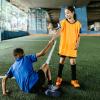
Have you ever noticed that parenting trends are like nutrition and health advice? First, there is the next big discovery, and then uh oh, we find out that there are kinks in the argument. Self-esteem was the end-all and be-all of the '80s, and then it was teaching to the learning style of the child. (Perhaps you didn’t know we were way over those big deals?) Unfortunately, parents often read about the exciting new sensations and then miss the less exciting analysis that follows months or even years later that exposes the flies in the ointment.
In this six-part series — this being the fifth installment — I’ll revisit common ideas about parenting that have been distorted, misinterpreted or oversimplified and give you the latest information. Here’s the latest:
Parenting myth no. 5: The growth mindset improves children’s academic performance by praising effort.
If you are a parent or teacher, you’ve probably heard of the “growth versus fixed mindset” research. Essentially, individuals who believe their talents can be developed through effort and employing effective learning strategies have a growth mindset and are more successful than those who have fixed mindset and believe that their talents are innate.
As with many sensations, applying the concept has run into problems as people try to apply it widely. Implementers may ignore structural problems in our educational systems, misinterpret it or confuse it with the self-fulfilling prophecy of low versus high expectations.
In a book called Mindset: The New Psychology of Success, author Carol S. Dweck, Ph.D., described decades of important research which showed how children with a “fixed versus growth mindset” created two different psychological worlds for themselves that influenced motivation for achievement.
Kids with a fixed mindset believe that their achievement depends on innate ability and thus end up very concerned about whether they’ll be judged smart or not. Told that they are smart but at some point experiencing less than stellar performance, they avoid challenge, become fearful of mistakes, are unable to handle setbacks and hide or deny their struggles.
Kids with the growth mindset believe that achievement depends on effort and learning. When faced with setbacks or failure, they get help with alternative learning strategies. Interventions with students who are having academic difficulties teach them that the brain is like a muscle. It needs to be exercised and trained by practice and skill-building to learn math and perform math problems. Students who participate in such programs improve their academic performance more than those who do not receive such instruction.
Developing the brain muscle with effort and practice is helpful, but there are still students who receive this instruction who don’t improve. Pulling yourself out of an failing, academic sink-hole is more complicated than building a growth mindset. What’s happening at home? How many ACEs (childhood trauma, stressors, hardships) have you sustained? How do you feel at your school? What peers do you hang out with? How is your mental health and your executive functioning skills?
Another problem with the application of the growth mindset is it that has been equated with just effort. Adults may encourage and praise effort and neglect to provide individual children with new strategies to try when they are failing. Instead of focusing on why some children just can’t learn, we need to find ways to help them learn.
Dweck addressed this misconception in an article she wrote for Education Week. She articulated what keeps her up at night:
“It’s the fear that the mindset concepts, which grew up to counter the failed self-esteem movement, will be used to perpetuate that movement. In other words, if you want to make students feel good, even if they’re not learning, just praise their effort! Want to hide learning gaps from them? Just tell them, ‘Everyone is smart!’ The growth mindset was intended to help close achievement gaps, not hide them.”
Adults need to help struggling students crack the code of their individual learning process. All kids can learn and build skills when we pitch our efforts to the right zone in their learning lapses in the right way. There is a sweet spot where they are challenged but not overwhelmed, experience enough success that they keep trying, and receive helpful guidance when they get stuck.
Parents often say to their children, “I don’t expect perfection or straight As. I expect you to put forth effort to do your best.” But then when they see their child avoid homework or show a lack of effort, they exhort them to try harder, live up to their potential and/or demonstrate a growth mindset by building the brain muscle by practicing more. Or, they may try encouraging them without helping them with problem-solving, which may range from social and emotional difficulties to problems at school.
Dweck has contributed greatly to our understanding of children’s academic motivation. However, she would be the first one to acknowledge it isn’t a magic bullet for all the problems that can plague students. Learning and motivation for children is very complex and individualistic. Let’s not dumb it down to encouraging kids to just work harder.
The takeaway
The growth mindset is not just about effort or cheering kids on with lots of praise. It’s about helpful helping. Parents may say they endorse a growth mindset but react to their kids’ failings as if they just aren’t trying hard enough or worse, are just lazy about putting forth effort. Every child deserves to be treated as a unique and complex learner. If there is a problem, adults should take on the challenge of figuring out how to help them.
Read more parenting mythsThis six-part series will revisit common ideas about parenting that have been distorted, misinterpreted or oversimplified — and provide you with the latest information.
|











